北师大版(2019)选择性必修第二册Unit 6 The Media Lesson 2 听力材料及练习讲解课件(34张PPT)
文档属性
| 名称 | 北师大版(2019)选择性必修第二册Unit 6 The Media Lesson 2 听力材料及练习讲解课件(34张PPT) | 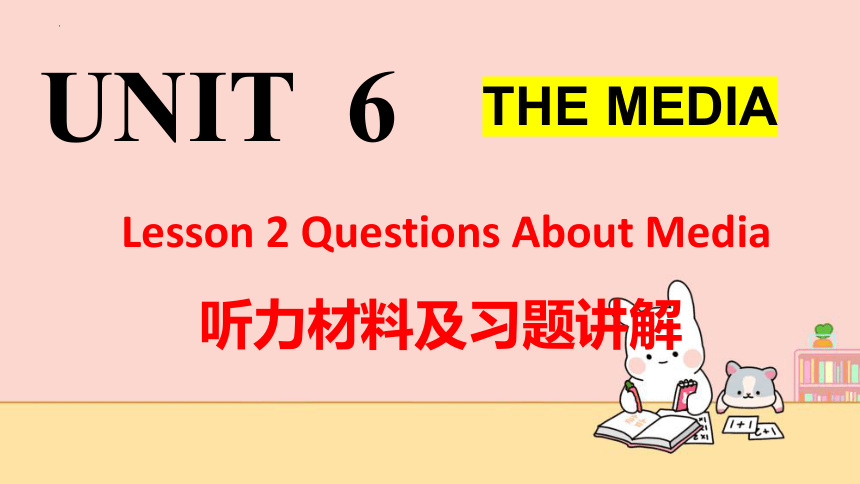 | |
| 格式 | pptx | ||
| 文件大小 | 1.2MB | ||
| 资源类型 | 教案 | ||
| 版本资源 | 北师大版(2019) | ||
| 科目 | 英语 | ||
| 更新时间 | 2022-12-01 16:21:34 | ||
图片预览

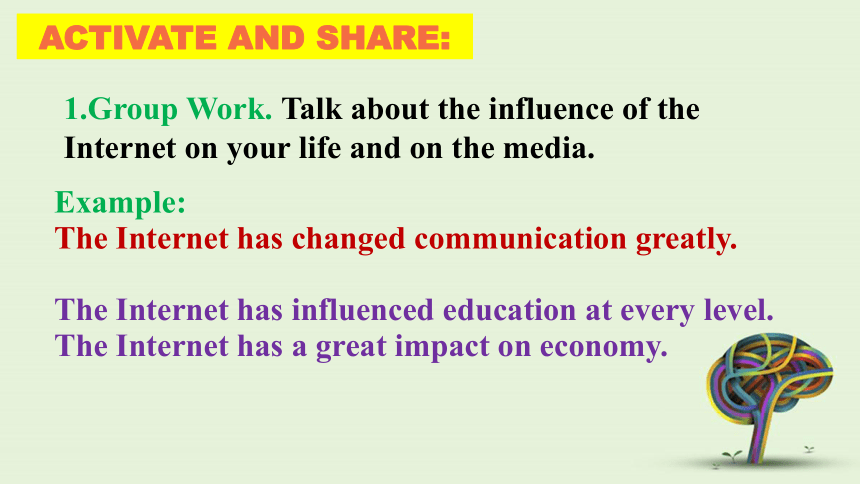
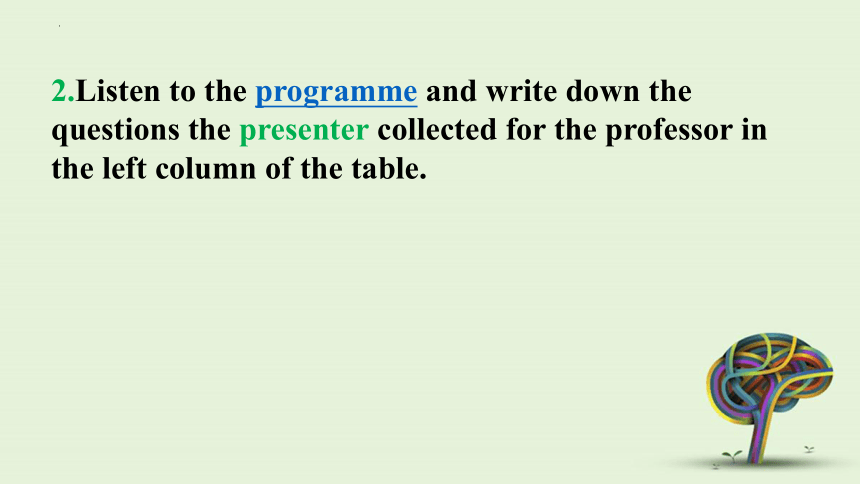
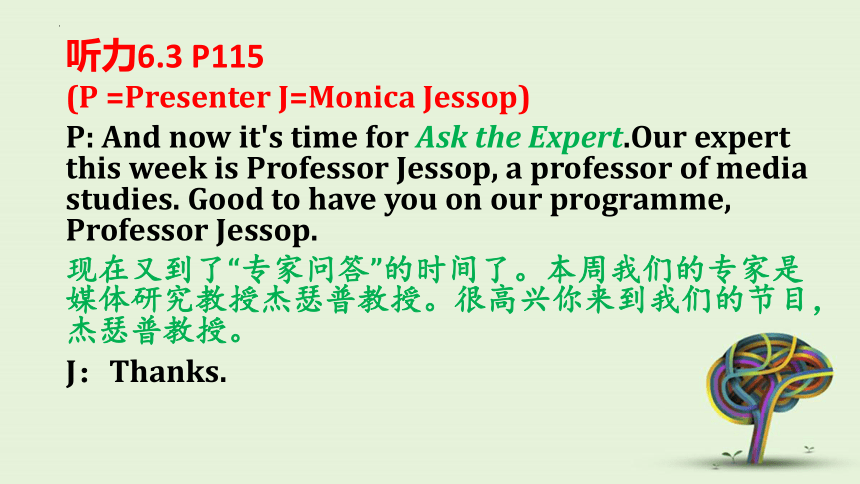
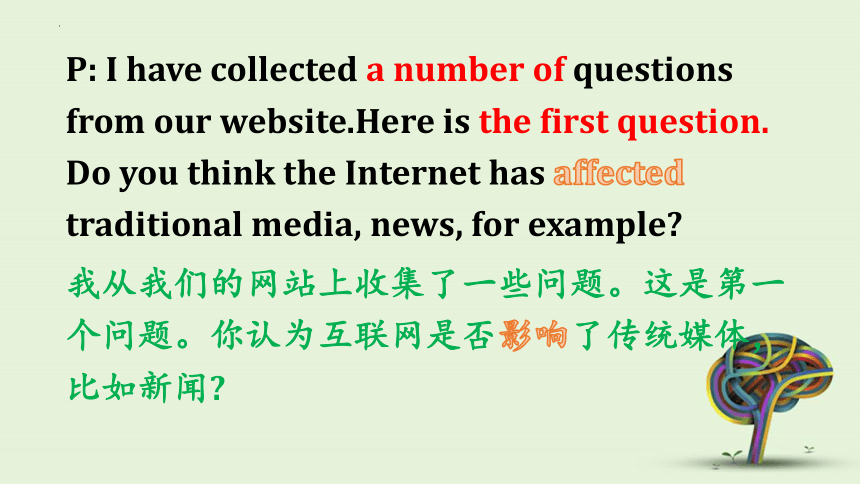
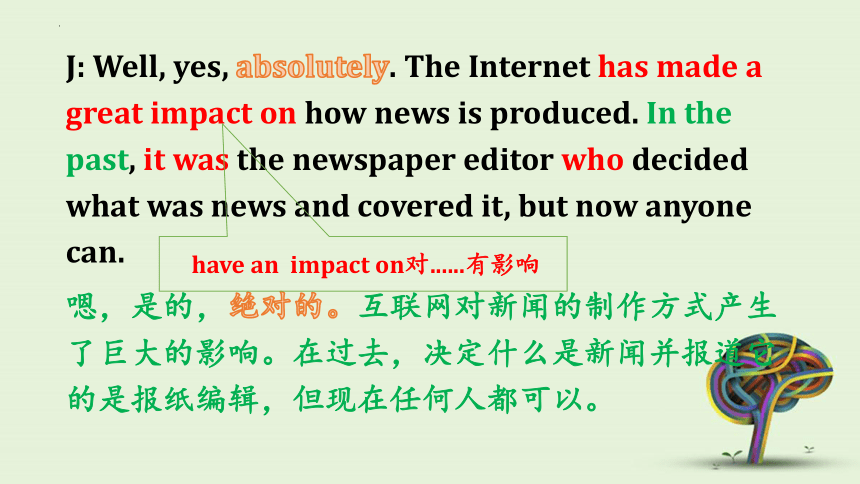
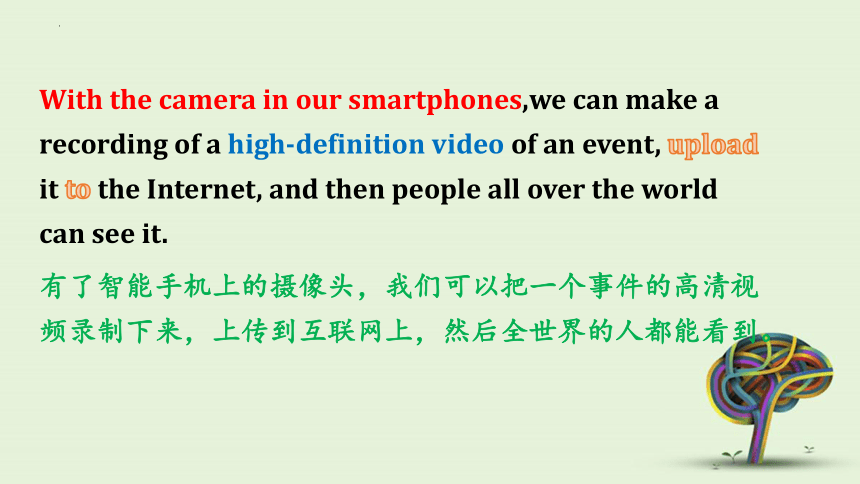
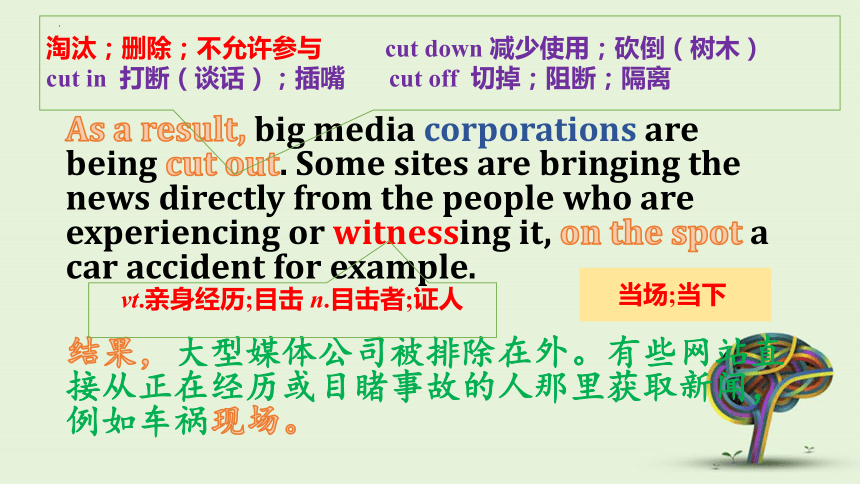
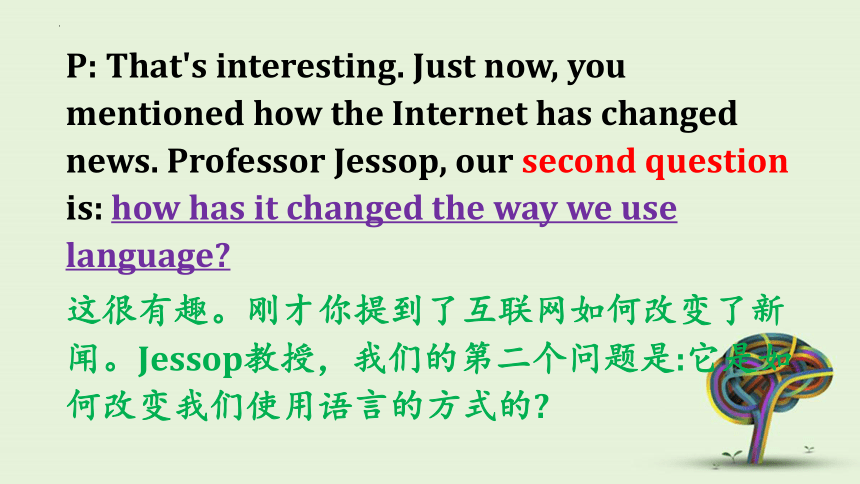
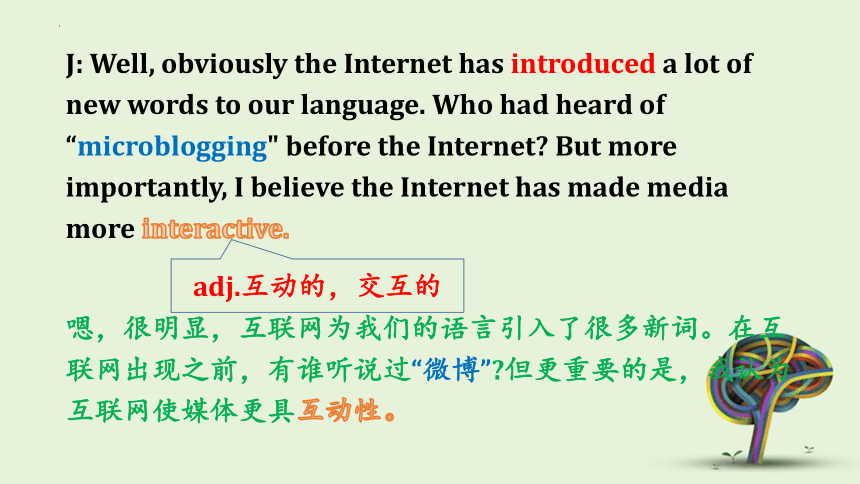
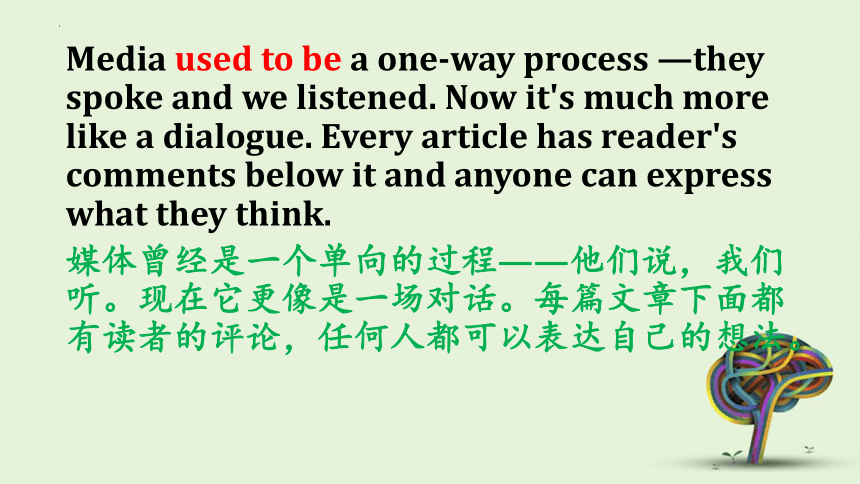
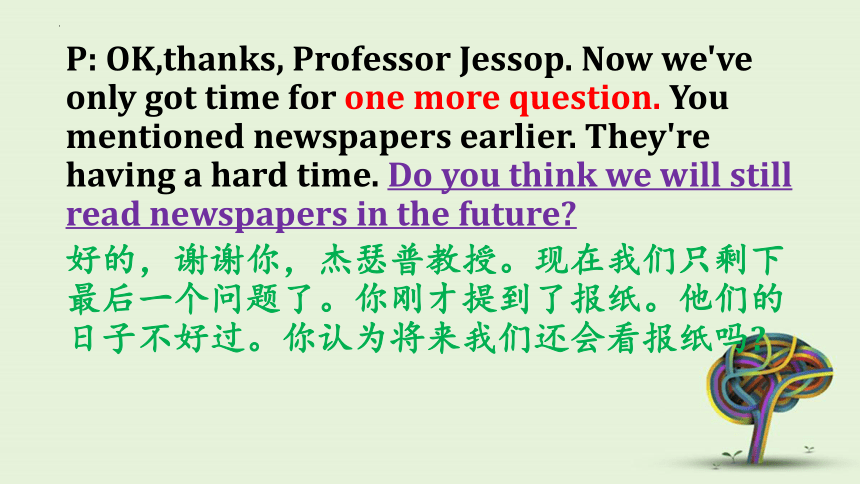
文档简介
(共34张PPT)
THE MEDIA
UNIT 6
Lesson 2 Questions About Media
听力材料及习题讲解
1.Group Work. Talk about the influence of the Internet on your life and on the media.
Example:
The Internet has changed communication greatly.
The Internet has influenced education at every level.
The Internet has a great impact on economy.
ACTIVATE AND SHARE:
2.Listen to the programme and write down the questions the presenter collected for the professor in the left column of the table.
听力6.3 P115
(P =Presenter J=Monica Jessop)
P: And now it's time for Ask the Expert.Our expert this week is Professor Jessop, a professor of media studies. Good to have you on our programme, Professor Jessop.
现在又到了“专家问答”的时间了。本周我们的专家是媒体研究教授杰瑟普教授。很高兴你来到我们的节目,杰瑟普教授。
J:Thanks.
P: I have collected a number of questions from our website.Here is the first question. Do you think the Internet has affected traditional media, news, for example
我从我们的网站上收集了一些问题。这是第一个问题。你认为互联网是否影响了传统媒体,比如新闻
J: Well, yes, absolutely. The Internet has made a great impact on how news is produced. In the past, it was the newspaper editor who decided what was news and covered it, but now anyone can.
嗯,是的,绝对的。互联网对新闻的制作方式产生了巨大的影响。在过去,决定什么是新闻并报道它的是报纸编辑,但现在任何人都可以。
have an impact on对......有影响
With the camera in our smartphones,we can make a recording of a high-definition video of an event, upload it to the Internet, and then people all over the world can see it.
有了智能手机上的摄像头,我们可以把一个事件的高清视频录制下来,上传到互联网上,然后全世界的人都能看到。
As a result, big media corporations are being cut out. Some sites are bringing the news directly from the people who are experiencing or witnessing it, on the spot a car accident for example.
结果,大型媒体公司被排除在外。有些网站直接从正在经历或目睹事故的人那里获取新闻,例如车祸现场。
vt.亲身经历;目击 n.目击者;证人
淘汰;删除;不允许参与 cut down 减少使用;砍倒(树木) cut in 打断(谈话);插嘴 cut off 切掉;阻断;隔离
当场;当下
P: That's interesting. Just now, you mentioned how the Internet has changed news. Professor Jessop, our second question is: how has it changed the way we use language
这很有趣。刚才你提到了互联网如何改变了新闻。Jessop教授,我们的第二个问题是:它是如何改变我们使用语言的方式的
J: Well, obviously the Internet has introduced a lot of new words to our language. Who had heard of “microblogging" before the Internet But more importantly, I believe the Internet has made media more interactive.
嗯,很明显,互联网为我们的语言引入了很多新词。在互联网出现之前,有谁听说过“微博” 但更重要的是,我认为互联网使媒体更具互动性。
adj.互动的,交互的
Media used to be a one-way process —they spoke and we listened. Now it's much more like a dialogue. Every article has reader's comments below it and anyone can express what they think.
媒体曾经是一个单向的过程——他们说,我们听。现在它更像是一场对话。每篇文章下面都有读者的评论,任何人都可以表达自己的想法。
P: OK,thanks, Professor Jessop. Now we've only got time for one more question. You mentioned newspapers earlier. They're having a hard time. Do you think we will still read newspapers in the future
好的,谢谢你,杰瑟普教授。现在我们只剩下最后一个问题了。你刚才提到了报纸。他们的日子不好过。你认为将来我们还会看报纸吗
J:Most countries have seen a drop in newspaper sales in the last few years. It's not just the loss of readers that is a problem. In the US, newspapers make almost 90%of their money from advertising.This has occurred for several reasons.
在过去几年里,大多数国家的报纸销量都有所下降。这不仅仅是读者流失的问题。在美国,报纸90%的收入来自广告。出现这种情况有几个原因。
强调的不是人时,可用it is/was...that...强调句型。
Firstly, a lot of companies and people now choose to advertise online. Secondly, when newspaper sales drop, fewer people want to advertise in the paper and they won't pay as much to advertise. In my opinion, newspaper business will find it much harder to survive in the future.
首先,现在很多公司和个人都选择在网上做广告。其次,当报纸销量下降时,更少的人想在报纸上做广告,他们不会花那么多钱做广告。在我看来,报业将发现它在未来更难生存。
it 作形式宾语代替 to survive in the future
P: OK, thanks Professor Jessop. It's a pleasure as always to talk to you and thanks for taking part in Ask the Expert.
好的,谢谢你,杰瑟普教授。一如既往,与您交谈是我的荣幸,感谢您参加“专家问答”节目。
2.Listen to the programme and write down the questions the presenter collected for the professor in the left column of the table.
Question Professor Jessop’s answer
Question 1:
Question 2:
Question 3:
Do you think the Internet has affected traditional media, news, for example
How has it changed the way we use language
Do you think we will still read newspaper in the future
b. g, h, j
c, d, e, k
a, f, i
3.Read the following statements.Group the professor’s answers for each question in the right column in Activity 2. Then listen to the programme and check.
a. Fewer people and companies chose to advertise in the newspaper.
b. Make a recording of a high-definition video of an event, and upload it to the Internet by smartphones.
c. The Internet has introduced a lot of new words to our language.
d. The word “microblogging” did not exist before the Internet.
e. Every article has reader’s comments below it and everyone can express what they think.
Q3
Q1
Q2
Q2
Q2
f. In my opinion, newspaper businesses will find it much harder to survive in the future.
g. Big media corporations are being cut out.
h. Anyone can decide what is news.
i. Most countries have seen a drop in newspaper sales.
j. The Internet has made a great impact on how news is produced.
k. I believe the Internet has made media more interactive.
Q3
Q3
Q1
Q1
Q1
Q2
4.Listen to the programme again. Decide whether Professor Jessop’s answers are facts or opinions before each statement in Activity 3.
Identifying Facts from Opinions
Speakers have their opinions when talking about a specific issue.
They may use the facts to support their opinions.
Pay attention to the words like I believe, I think, etc. to indicate the opinions.
Skill Builder
a. Fewer people and companies chose to advertise in the newspaper.
b. Make a recording of a high-definition video of an event, and upload it to the Internet by smartphones.
c. The Internet has introduced a lot of new words to our language.
d. The word “microblogging” did not exist before the Internet.
e. Every article has reader’s comments below it and everyone can express what they think.
F
F
F
F
F
f. In my opinion, newspaper businesses will find it much harder to survive in the future.
g. Big media corporations are being cut out.
h. Anyone can decide what is news.
i. Most countries have seen a drop in newspaper sales.
j. The Internet has made a great impact on how news is produced.
k. I believe the Internet has made media more interactive.
O
O
O
F
F
F
5.Pair Work. Role-play the programme with your partner. Add your opinions or facts.
Presenter: And now it’s time for Ask the Expert. Our expert this week is Professor Jessop, a professor of media studies. Good to have you on our programme, Professor Jessop.
Monica Jessop: Thanks.
...
6.Listen to two people talking about how people followed the news 30 years ago. Answer the questions.
听力6.4 P116
(S = A senior person T = A teenager)
S: About 30 years ago, everyone watched the same news and talked about it at work the next day.
大约30年前,每个人都看同样的新闻,第二天上班的时候就会谈论它。
T:Oh That is very different from what we do nowadays.
哦 这和我们现在做的很不一样。
S: Right. In those days, the families would watch the evening news on TV.
没错。在那些日子里,家家户户都会看电视上的晚间新闻。
T:So does that mean that everyone watched the same TV programme Can you tell me more about it
那是不是说每个人都看同一个电视节目 你能多告诉我一些吗
S: After dinner, families would gather around the television and watch the news from7 pm to 7.30 pm.
晚饭后,一家人会聚在电视机前看晚上7点到7点半的新闻。
T:Really That's interesting. But what I don't quite understand is that everyone in the family watched the same news together. Did they all have the same interests
真的吗 这很有趣。但我不太明白的是,家里所有人都在一起看同一个新闻。他们都有相同的兴趣吗
S: Well, let me put it another way. Due to the limited ways to find out the most up-to- date news in those days, watching the evening news became a kind of common practice for many families. Did I make myself clearer
好吧,让我换一种说法。在那个年代,由于获取最新新闻的途径有限,看晚间新闻成了许多家庭的一种惯例。我说得清楚了吗
T: Ah, that must have happened before we had computers and the Internet.
啊,那一定是在我们有电脑和互联网之前。
S: Exactly. We now can follow the news at any time 24 hours a day.
没错。我们现在可以在一天24小时的任何时间关注新闻。
6.Listen to two people talking about how people followed the news 30 years ago. Answer the questions.
1. What would families do in the evening
2. How would they get the news
After dinner, families would gather around the
television and watch the news from 7 pm to 7:30 pm.
They would watch the news on TV.
3. Why did they do so
Due to the limited ways to find out the most up-to-date news in those days, watching the evening news became a kind of common practice for many families.
习惯做法
7.Listen and plete the Talk Builder.
Clarifying and Asking Questions
Clarifying
1. Let me __________________.
2. Did I ____________________
Asking Questions
1. So _______________ everyone watched the same TV programme
2. Can you _____________________
3. ________________ the same interests
put it another way
make myself clearer
does that mean
tell me more about it
Did they all have
8
Group Work. Search online and find out how the different types of media have changed in the past 100 years. What are the advantages and disadvantages of each type of media
1894: the first projector invented
1915: the first feature length movie
How have the movies changed over the years
1948: Uncle Sam breaks up the monopolies
1972: the first VHS tape released
2007: Netflix opens its streaming service
Thank you for listening!
THE MEDIA
UNIT 6
Lesson 2 Questions About Media
听力材料及习题讲解
1.Group Work. Talk about the influence of the Internet on your life and on the media.
Example:
The Internet has changed communication greatly.
The Internet has influenced education at every level.
The Internet has a great impact on economy.
ACTIVATE AND SHARE:
2.Listen to the programme and write down the questions the presenter collected for the professor in the left column of the table.
听力6.3 P115
(P =Presenter J=Monica Jessop)
P: And now it's time for Ask the Expert.Our expert this week is Professor Jessop, a professor of media studies. Good to have you on our programme, Professor Jessop.
现在又到了“专家问答”的时间了。本周我们的专家是媒体研究教授杰瑟普教授。很高兴你来到我们的节目,杰瑟普教授。
J:Thanks.
P: I have collected a number of questions from our website.Here is the first question. Do you think the Internet has affected traditional media, news, for example
我从我们的网站上收集了一些问题。这是第一个问题。你认为互联网是否影响了传统媒体,比如新闻
J: Well, yes, absolutely. The Internet has made a great impact on how news is produced. In the past, it was the newspaper editor who decided what was news and covered it, but now anyone can.
嗯,是的,绝对的。互联网对新闻的制作方式产生了巨大的影响。在过去,决定什么是新闻并报道它的是报纸编辑,但现在任何人都可以。
have an impact on对......有影响
With the camera in our smartphones,we can make a recording of a high-definition video of an event, upload it to the Internet, and then people all over the world can see it.
有了智能手机上的摄像头,我们可以把一个事件的高清视频录制下来,上传到互联网上,然后全世界的人都能看到。
As a result, big media corporations are being cut out. Some sites are bringing the news directly from the people who are experiencing or witnessing it, on the spot a car accident for example.
结果,大型媒体公司被排除在外。有些网站直接从正在经历或目睹事故的人那里获取新闻,例如车祸现场。
vt.亲身经历;目击 n.目击者;证人
淘汰;删除;不允许参与 cut down 减少使用;砍倒(树木) cut in 打断(谈话);插嘴 cut off 切掉;阻断;隔离
当场;当下
P: That's interesting. Just now, you mentioned how the Internet has changed news. Professor Jessop, our second question is: how has it changed the way we use language
这很有趣。刚才你提到了互联网如何改变了新闻。Jessop教授,我们的第二个问题是:它是如何改变我们使用语言的方式的
J: Well, obviously the Internet has introduced a lot of new words to our language. Who had heard of “microblogging" before the Internet But more importantly, I believe the Internet has made media more interactive.
嗯,很明显,互联网为我们的语言引入了很多新词。在互联网出现之前,有谁听说过“微博” 但更重要的是,我认为互联网使媒体更具互动性。
adj.互动的,交互的
Media used to be a one-way process —they spoke and we listened. Now it's much more like a dialogue. Every article has reader's comments below it and anyone can express what they think.
媒体曾经是一个单向的过程——他们说,我们听。现在它更像是一场对话。每篇文章下面都有读者的评论,任何人都可以表达自己的想法。
P: OK,thanks, Professor Jessop. Now we've only got time for one more question. You mentioned newspapers earlier. They're having a hard time. Do you think we will still read newspapers in the future
好的,谢谢你,杰瑟普教授。现在我们只剩下最后一个问题了。你刚才提到了报纸。他们的日子不好过。你认为将来我们还会看报纸吗
J:Most countries have seen a drop in newspaper sales in the last few years. It's not just the loss of readers that is a problem. In the US, newspapers make almost 90%of their money from advertising.This has occurred for several reasons.
在过去几年里,大多数国家的报纸销量都有所下降。这不仅仅是读者流失的问题。在美国,报纸90%的收入来自广告。出现这种情况有几个原因。
强调的不是人时,可用it is/was...that...强调句型。
Firstly, a lot of companies and people now choose to advertise online. Secondly, when newspaper sales drop, fewer people want to advertise in the paper and they won't pay as much to advertise. In my opinion, newspaper business will find it much harder to survive in the future.
首先,现在很多公司和个人都选择在网上做广告。其次,当报纸销量下降时,更少的人想在报纸上做广告,他们不会花那么多钱做广告。在我看来,报业将发现它在未来更难生存。
it 作形式宾语代替 to survive in the future
P: OK, thanks Professor Jessop. It's a pleasure as always to talk to you and thanks for taking part in Ask the Expert.
好的,谢谢你,杰瑟普教授。一如既往,与您交谈是我的荣幸,感谢您参加“专家问答”节目。
2.Listen to the programme and write down the questions the presenter collected for the professor in the left column of the table.
Question Professor Jessop’s answer
Question 1:
Question 2:
Question 3:
Do you think the Internet has affected traditional media, news, for example
How has it changed the way we use language
Do you think we will still read newspaper in the future
b. g, h, j
c, d, e, k
a, f, i
3.Read the following statements.Group the professor’s answers for each question in the right column in Activity 2. Then listen to the programme and check.
a. Fewer people and companies chose to advertise in the newspaper.
b. Make a recording of a high-definition video of an event, and upload it to the Internet by smartphones.
c. The Internet has introduced a lot of new words to our language.
d. The word “microblogging” did not exist before the Internet.
e. Every article has reader’s comments below it and everyone can express what they think.
Q3
Q1
Q2
Q2
Q2
f. In my opinion, newspaper businesses will find it much harder to survive in the future.
g. Big media corporations are being cut out.
h. Anyone can decide what is news.
i. Most countries have seen a drop in newspaper sales.
j. The Internet has made a great impact on how news is produced.
k. I believe the Internet has made media more interactive.
Q3
Q3
Q1
Q1
Q1
Q2
4.Listen to the programme again. Decide whether Professor Jessop’s answers are facts or opinions before each statement in Activity 3.
Identifying Facts from Opinions
Speakers have their opinions when talking about a specific issue.
They may use the facts to support their opinions.
Pay attention to the words like I believe, I think, etc. to indicate the opinions.
Skill Builder
a. Fewer people and companies chose to advertise in the newspaper.
b. Make a recording of a high-definition video of an event, and upload it to the Internet by smartphones.
c. The Internet has introduced a lot of new words to our language.
d. The word “microblogging” did not exist before the Internet.
e. Every article has reader’s comments below it and everyone can express what they think.
F
F
F
F
F
f. In my opinion, newspaper businesses will find it much harder to survive in the future.
g. Big media corporations are being cut out.
h. Anyone can decide what is news.
i. Most countries have seen a drop in newspaper sales.
j. The Internet has made a great impact on how news is produced.
k. I believe the Internet has made media more interactive.
O
O
O
F
F
F
5.Pair Work. Role-play the programme with your partner. Add your opinions or facts.
Presenter: And now it’s time for Ask the Expert. Our expert this week is Professor Jessop, a professor of media studies. Good to have you on our programme, Professor Jessop.
Monica Jessop: Thanks.
...
6.Listen to two people talking about how people followed the news 30 years ago. Answer the questions.
听力6.4 P116
(S = A senior person T = A teenager)
S: About 30 years ago, everyone watched the same news and talked about it at work the next day.
大约30年前,每个人都看同样的新闻,第二天上班的时候就会谈论它。
T:Oh That is very different from what we do nowadays.
哦 这和我们现在做的很不一样。
S: Right. In those days, the families would watch the evening news on TV.
没错。在那些日子里,家家户户都会看电视上的晚间新闻。
T:So does that mean that everyone watched the same TV programme Can you tell me more about it
那是不是说每个人都看同一个电视节目 你能多告诉我一些吗
S: After dinner, families would gather around the television and watch the news from7 pm to 7.30 pm.
晚饭后,一家人会聚在电视机前看晚上7点到7点半的新闻。
T:Really That's interesting. But what I don't quite understand is that everyone in the family watched the same news together. Did they all have the same interests
真的吗 这很有趣。但我不太明白的是,家里所有人都在一起看同一个新闻。他们都有相同的兴趣吗
S: Well, let me put it another way. Due to the limited ways to find out the most up-to- date news in those days, watching the evening news became a kind of common practice for many families. Did I make myself clearer
好吧,让我换一种说法。在那个年代,由于获取最新新闻的途径有限,看晚间新闻成了许多家庭的一种惯例。我说得清楚了吗
T: Ah, that must have happened before we had computers and the Internet.
啊,那一定是在我们有电脑和互联网之前。
S: Exactly. We now can follow the news at any time 24 hours a day.
没错。我们现在可以在一天24小时的任何时间关注新闻。
6.Listen to two people talking about how people followed the news 30 years ago. Answer the questions.
1. What would families do in the evening
2. How would they get the news
After dinner, families would gather around the
television and watch the news from 7 pm to 7:30 pm.
They would watch the news on TV.
3. Why did they do so
Due to the limited ways to find out the most up-to-date news in those days, watching the evening news became a kind of common practice for many families.
习惯做法
7.Listen and plete the Talk Builder.
Clarifying and Asking Questions
Clarifying
1. Let me __________________.
2. Did I ____________________
Asking Questions
1. So _______________ everyone watched the same TV programme
2. Can you _____________________
3. ________________ the same interests
put it another way
make myself clearer
does that mean
tell me more about it
Did they all have
8
Group Work. Search online and find out how the different types of media have changed in the past 100 years. What are the advantages and disadvantages of each type of media
1894: the first projector invented
1915: the first feature length movie
How have the movies changed over the years
1948: Uncle Sam breaks up the monopolies
1972: the first VHS tape released
2007: Netflix opens its streaming service
Thank you for listening!
同课章节目录
- Unit 4 Humour
- Lesson 1 What’s So Funny?
- Lesson 2 Why Do We Need Humour?
- Lesson 3 My Favourite Comedian
- Unit 5 Education
- Lesson 1 Enlightening a Mind
- Lesson 2 The Objectives of Education
- Lesson 3 Understanding
- Unit 6 The Media
- Lesson 1 From Page to Screen
- Lesson 2 Questions about Media
- Lesson 3 The Advertising Game
